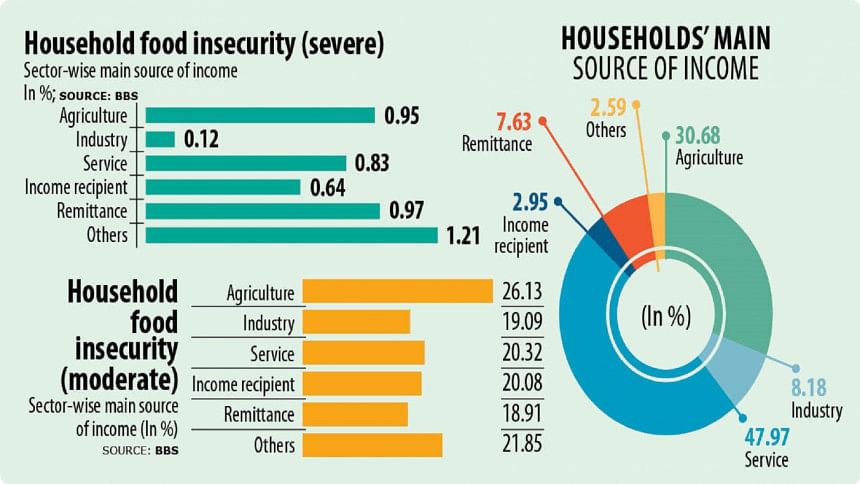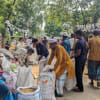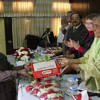Farmers face moderate to severe food insecurity: BBS

Households in Bangladesh that depend on agriculture as their main source of income face moderate to severe risk of food insecurity despite being directly involved in food production, according to a recent survey.
One in every four households, or 26.13 percent, that rely on agriculture for their income face food insecurity, showed the latest report of the Bangladesh Bureau of Statistics (BBS).
The "Food Security Statistics 2023" survey, which was the first of its kind in Bangladesh, was conducted among 29,760 homes across the country in June last year.
The high prevalence of food insecurity at moderate levels can be considered a predictor of various forms of diet-related health conditions resulting from micronutrient deficiencies, as defined by the BBS.
Additionally, about 0.95 percent of the farming families are in extreme food crisis or acute insecurity.
It also found that food insecurity was lower among those that received remittance from family members.
Overall, 19.09 percent of those employed by the industrial sector endured moderate to severe food insecurity while 20.32 percent of service sector workers faced the same.
The survey comes at a time when inflation remains elevated, leaving low-income and limited-income groups to struggle to make ends meet.
The state-run statistical agency measured the varying degrees of food security across Bangladesh based on the answers to eight types of questions in the survey.
The questions were regarding whether participants went without eating for a whole day, skipped a meal, ran out of food at home, ate less than they should, ate healthy and nutritious food, or were worried about not having enough food to eat.
"Access to food for agricultural labour is very limited even though they are involved in producing food," said Md Asaduzzaman, former research director of the Bangladesh Institute of Development Studies.
The number of food insecure people would have been even higher had the survey accounted for landless farmers, he added.
"Their situation is even worse than that of rickshaw-pullers as they don't earn money regularly," the economist said.
Against this backdrop, he urged for the adoption of more agricultural labour-intensive social safety net programmes.
Abdul Halim, project director of the BBS survey, informed that they only took into account agricultural households that own at least five decimals of land and members of the labour force that they employ.
As per the final report of the Population and Household Census-2022, Bangladesh's total population stands at 16.98 crore, spread across about 4.1 crore households.
In terms of overall population, around 3.77 crore, or 22 percent, of the population experienced moderate to severe food insecurity in 2023, the survey showed.
Meanwhile, 17 lakh people are at risk of extreme food insecurity.
The survey also showed that a significant portion, or 25.5 percent, of households answered that they had to borrow money to cover basic food needs.
Taking loans for such needs is more common in rural areas, with 27.8 percent in those areas having done so. Urban and city corporation areas stood at 23.6 percent and 15.3 percent respectively.
According to the BBS survey, around 31 percent of the country's households are involved in agriculture. Of them, 39 percent are based in rural areas.
Consumer price data from the BBS shows that inflation in rural areas stayed above the figure in towns and cities during 32 of the 38 months from January 2021 till February 2024.
Elevated food prices are one of the major drivers for higher inflation in rural areas although villages, home to nearly 70 percent of the population, are major suppliers of staple food items, including grains, vegetables, and meat.
Mohammad Jahangir Alam, a professor of the agribusiness and marketing department at Bangladesh Agricultural University, said the lower wage rate for farm labourers pushed them into food insecurity.
"They [labourers] have had to reduce their nutritional food intake due to persistently high inflation," he added.

 For all latest news, follow The Daily Star's Google News channel.
For all latest news, follow The Daily Star's Google News channel. 









Comments